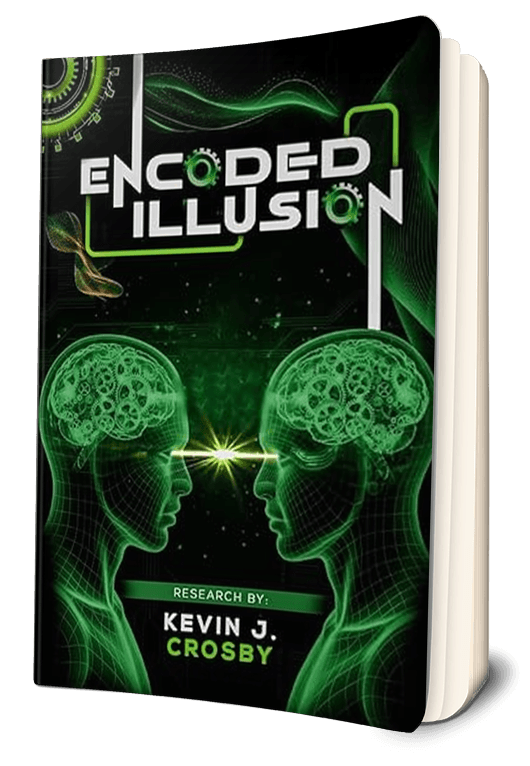You catch yourself mid-sentence, repeating something you’ve said countless times before – perhaps an opinion about education, or a belief about human nature – and suddenly pause. Where did that thought come from? Can you trace it back to its source, or does it simply feel like something you’ve always known?
That unsettling moment when you realise you can’t remember where you first encountered an idea might be exactly what Kevin J. Crosby wants you to notice.
In his upcoming book Encoded Illusion, set for release this summer, Crosby suggests we’ve been living with minds that aren’t entirely our own. The premise isn’t science fiction – it’s grounded in decades of institutional experience spanning military analysis, educational reform and cognitive research. This isn’t someone theorising from the sidelines; Crosby has spent his career inside the very systems he now questions.
The Architecture of Engineered Thinking
At the heart of Encoded Illusion lies a disturbing proposition: modern education, media and emerging technologies haven’t simply influenced how we think – they’ve programmed it. Crosby traces this programming back to early 20th century education reformers like Edward Thorndike, whose scientific approach to learning fundamentally shaped how schools operate today.
Thorndike’s legacy isn’t just theoretical. His emphasis on standardised testing, carefully ordered learning tasks and measurable outcomes created the framework for what Crosby sees as systematic mind control. Rather than nurturing independent thinking, Thorndike’s administrative systems – grading, testing, teacher credentialing – prioritised efficiency and accountability over genuine learning.
‘We’re seeing the evolution of control,’ Crosby writes, ‘not through overt tyranny, but through elegant, engineered obedience.’ The line between education and indoctrination, he suggests, dissolved long before we noticed.
Fast forward to 2025, and the tools of influence have become exponentially more sophisticated. Neuralink has already implanted brain-computer interfaces in three humans this year, with plans for 30 more patients. Meanwhile, social media algorithms curate our daily thoughts through personalised content designed to maximise engagement, creating filter bubbles that reinforce existing beliefs whilst limiting exposure to diverse perspectives.
Beyond Criticism: The Suppressed Capacities
Yet Encoded Illusion doesn’t dwell in despair. The book’s final section shifts tone dramatically, challenging the materialist narrative that has dominated how we understand human potential. Here, Crosby explores territory that mainstream science has long dismissed: extrasensory perception, intuition and collective consciousness.
This isn’t fringe speculation. The U.S. government’s Stargate Project ran from the 1970s to 1995, investigating remote viewing and psychic phenomena for intelligence gathering during the Cold War. Whilst official reviews concluded the data was too vague for actionable intelligence, the very existence of such programmes suggests authorities took these capacities seriously enough to fund them for over two decades.
Crosby’s argument is provocative: what if the systems designed to programme our minds have simultaneously worked to suppress our natural abilities? What if the standardised, algorithm-driven world has dulled precisely those human capacities that can’t be measured, controlled or monetised?
The Timing Couldn’t Be More Urgent
As recent research highlights the mental health crisis among students exposed to constant algorithmic manipulation, Crosby’s work reads less like speculation and more like essential preparation. The U.S. Surgeon General has issued advisories about social media’s harmful effects, comparing the need for warning labels to those on tobacco and alcohol.
Meanwhile, emotion-sensing technologies are advancing rapidly. Companies are developing sophisticated algorithms for real-time emotion detection using facial expressions, voice patterns and physiological signals. The automotive industry already deploys emotion-aware systems in advanced driver-assistance programs, adapting vehicle responses to detected emotional states.
The convergence is striking: just as technology gains unprecedented ability to read and influence our emotions, a book arrives asking whether we’ve lost touch with our own minds.
A Lens, Not a Doctrine
What makes Encoded Illusion compelling isn’t its answers but its restraint. Crosby doesn’t preach conspiracy theories or offer simplistic solutions. Instead, he provides what he calls ‘a lens, not a doctrine’ – encouraging readers to investigate their own cognitive experiences rather than accept his conclusions wholesale.
The book’s tone never shouts or panics. Rather than demanding we reject all technology or abandon modern life, Crosby asks us to pay attention to the edges of our experience. Those moments when a thought doesn’t quite feel like our own. The automatic repetition of opinions we can’t trace to their source. The strange familiarity of losing hours to scrolling.
This approach reflects Crosby’s own journey – someone who spent decades quietly questioning what most people accept without examination. He brings an insider’s perspective to the structural forces shaping public perception, offering critique born from experience rather than ideology.
The next time you catch yourself automatically repeating an opinion, or notice you’ve lost time to your phone, consider what Crosby is pointing towards. Taking conscious control of your mental fitness begins with recognising these automatic patterns. Who, after all, decided what’s on your mind?







